Newt Gingrich is once again square with the tax man, his 2012 presidential campaign having finally paid off a lingering debt with the Internal Revenue Service.
The “Newt 2012” committee had owed the IRS more than $26,000 for income tax liabilities and payments as recently as last autumn, although it cut that figure to about $1,000 by New Year’s Day.
The bad news for the former Republican speaker of the U.S. House of Representatives?
Gingrich’s campaign still owes dozens of other creditors a collective $4.65 million, according to a recently filed campaign finance report, and prospects of erasing it are bleak — the committee raised a little more than $17,000 during the year’s first three months by selling supporters’ personal information to a data broker.
Gingrich’s massive debt is more than any other on the roster of deadbeat presidential campaigns of yesteryear. It’s a lengthy list that includes Republicans Rick Santorum and Herman Cain and Democrats John Edwards and Al Sharpton, as the Center for Public Integrity previously reported.
Even President Barack Obama’s 2012 campaign hasn’t paid all its bills. It owed more than $2.3 million as of March 31, including debts to law firm Perkins Coie LLP and telecom company U.S. Cellular, according to federal records.
For Gingrich, the only debt his campaign cleared during the year’s first three months was its IRS tab, reporting the transaction to the Federal Election Commission on a fitting day, April 15.
Creditors still waiting for Gingrich campaign cash include Verizon Wireless, Twitter and consulting operations owned by Cain, his former Republican presidential rival, and ex-Rep. J.C. Watts, R-Okla.
Federally registered political committees are generally not allowed to formally terminate their operations until they pay off remaining debts, be that money owed to public entities such as the IRS, or private interests such as contractors.
This means some political committees remain technically active for years, even decades — and occasionally, after its namesake candidate has died.

